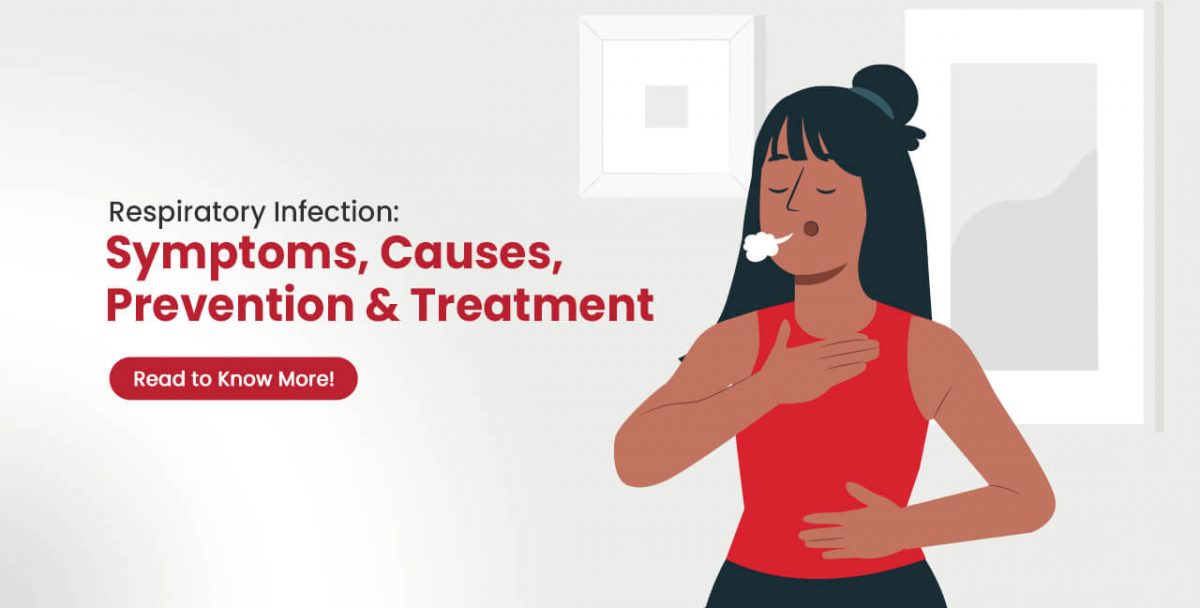Respiratory Infection: Symptoms, Causes, Prevention, and Treatment

Respiratory infections are among the most common health problems worldwide, affecting people of all ages. They occur when harmful viruses, bacteria, or other microorganisms invade the respiratory system, which includes the nose, throat, airways, and lungs. Understanding the symptoms, causes, and treatment options can help in managing these infections effectively and prevent complications.
What Is a Respiratory Infection?
A respiratory infection is any infection that affects the respiratory tract. It can be:
- Upper Respiratory Tract Infection (URTI): Affects the nose, sinuses, and throat (e.g., common cold, sinusitis, pharyngitis).
- Lower Respiratory Tract Infection (LRTI): Affects the lungs and lower airways (e.g., bronchitis, pneumonia, bronchiolitis).
Common Symptoms of Respiratory Infection
Symptoms can vary depending on whether it’s an upper or lower respiratory infection, but common signs include:
- Cough (dry or productive)
- Runny or blocked nose
- Sore throat
- Fever or chills
- Sneezing
- Fatigue and weakness
- Headache or body ache
- Shortness of breath (more common in lower respiratory infections)
- Wheezing or chest tightness
Seek medical help if symptoms worsen, breathing becomes difficult, or high fever persists.
Causes of Respiratory Infections
- Viral Infections: Most common cause, including cold viruses, influenza, RSV, and COVID-19.
- Bacterial Infections: Streptococcus pneumoniae, Mycoplasma pneumoniae, and others can cause pneumonia or severe infections.
- Fungal Infections: Less common but can affect immunocompromised individuals.
- Environmental Triggers: Air pollution, smoking, and allergens can make the respiratory tract more vulnerable.
Prevention of Respiratory Infections
- Practice Good Hygiene: Wash hands regularly, avoid touching your face, and cover your mouth when coughing or sneezing.
- Boost Immunity: Eat a balanced diet, exercise regularly, and get enough sleep.
- Stay Vaccinated: Flu shots and other recommended vaccines can prevent serious respiratory infections.
- Avoid Exposure: Stay away from sick individuals if possible and wear masks in crowded or high-risk areas.
- Quit Smoking: Smoking damages the lungs and increases infection risk.
Treatment for Respiratory Infections
Treatment depends on whether the infection is viral or bacterial:
Rest & Hydration: Essential for recovery.
Medications:
- Antiviral drugs (for flu or COVID-19 if prescribed)
- Antibiotics (only for bacterial infections)
- Fever reducers, decongestants, cough syrups for symptom relief
Home Remedies: Steam inhalation, warm saltwater gargles, and honey with warm water can soothe the throat.
Medical Care: Severe infections may require hospitalization, oxygen therapy, or IV medications.
Conclusion
Respiratory infections are common but can often be prevented with proper hygiene, vaccination, and a healthy lifestyle. Early recognition of symptoms and timely treatment are key to avoiding complications. If you experience persistent fever, severe cough, or difficulty breathing, consult a healthcare professional immediately. Regency Hospital Kanpur offers expert diagnosis and advanced treatment facilities to help you recover safely and protect your respiratory health. For specialized support, you can rely on Regency Hospital’s pulmonology care in Kanpur to manage and treat respiratory conditions effectively.
Frequently Asked Questions (FAQs)
- What’s the difference between a cold and a respiratory infection?
A cold is just one type of upper respiratory infection affecting the nose and throat. Respiratory infections can also involve the lower airways, such as bronchitis or pneumonia, which are usually more severe. - When should I see a doctor?
See a doctor if you have a high fever, severe cough, chest pain, shortness of breath, or if symptoms worsen or last longer than 7–10 days. Early treatment helps prevent complications. - Do I always need antibiotics?
No, most respiratory infections are caused by viruses and don’t need antibiotics. Antibiotics are only used for confirmed bacterial infections to avoid resistance. - Can I prevent them naturally?
Yes. Practicing good hygiene, eating a nutritious diet, staying hydrated, and sleeping well can boost immunity and lower your chances of getting infected. - Are they contagious?
Yes, most respiratory infections spread through droplets from coughs, sneezes, or close contact. Handwashing, masks, and avoiding sick people can reduce the risk.
Also Read: Chronic Obstructive Pulmonary Disease: Symptoms, Causes & Treatment

 Call-an-Ambulance
Call-an-Ambulance



